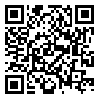September & October
Back to the articles list |
Back to browse issues page
1- PhD candidate in Cultural Sociology, Social Science department, Faculty of Literature and Humanities, University of Guilan, Rasht, Iran.
2- Assistant Professor of the Department of Social Sciences, Faculty of Literature and Humanities, University of Guilan. ,h.mosavi@guilan.ac.ir
3- Associate Professor, Department of Social Sciences, University of Guilan, Rasht, Iran.
2- Assistant Professor of the Department of Social Sciences, Faculty of Literature and Humanities, University of Guilan. ,
3- Associate Professor, Department of Social Sciences, University of Guilan, Rasht, Iran.
Abstract: (61 Views)
The present study examines the proverbs and folk beliefs of the Maraghians of Alamut from the perspective of cultural semantics and using Geertz's descriptive approach. The main goal of this research was to analyze the social and symbolic meanings of these cultural elements and their role in representing ethnic identity and regulating social relations. The findings showed that Maraghi proverbs are not only linguistic devices, but also meaningful structures that reinforce cultural values, social norms, and power relations. Some of these proverbs emphasize the importance of intra-group marriage, economic independence, and social solidarity, and act as mechanisms for intergenerational knowledge transmission. On the other hand, the folk beliefs of this community are mainly based on lived experience and interactions with the natural environment, and reflect people's understanding of natural and social phenomena. The results showed that these cultural elements act as a tool for maintaining ethnic identity and cultural resistance in the face of social change and modernization. The present study highlights the importance of recording and analyzing these cultural elements to better understand the processes of identity formation and cultural sustainability in local communities.
Keywords: Proverbs, folk beliefs, Maraghian Alamut, cultural semantics, ethnic identity, interpretive analysis, Clifford Geertz
Send email to the article author
| Rights and permissions | |
 |
This work is licensed under a Creative Commons Attribution-NonCommercial 4.0 International License. |







